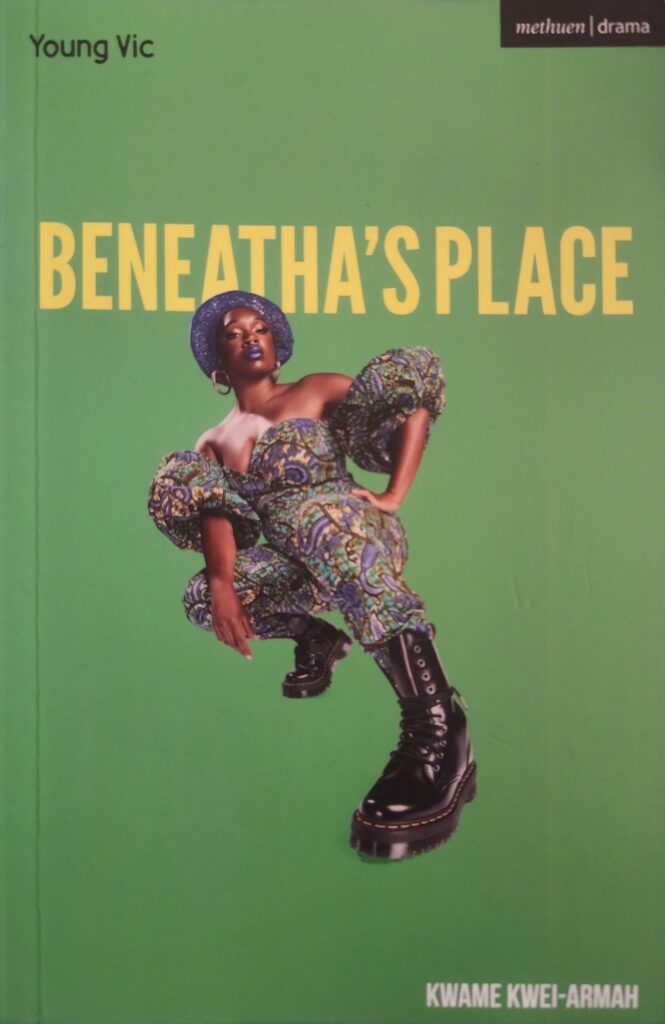By Takiyah Howard | If you have yet to read anything from the rich canon of Afro-European literature, let me introduce you to one great work, Beneatha’s Place (2023), a play written by Kwame Kwei-Armah. A spin-off from A Raisin in the Sun, by Lorraine Hansberry, Kwei-Armah’s Beneatha’s Place touches on many important themes, including gentrification, colonialism, imperialism, and superiority complexities, all while exposing the masks that people wear. One of the short play’s central themes is the fight for African American history to be recognized as essential to U.S. history and to incorporate it into the common core educational curriculum. Guided by the motto, “Those who control history own the future,” (44) Kwei-Armah shows how long this struggle is, traversing different eras in the play’s one scene and two acts. In the first scene, Beneatha is in the United States and 36 years old, protesting with her students; while Acts I and II takes place in her home in Nigeria when she is 26 and 70 years old. The different time frames show how long it took Beneatha to achieve her goal while demonstrating the pushback with which was been met. Beneatha’s Place sets the atmosphere by implicitly giving the reader an idea of what gentrification and colonialism feel like in her home in Nigeria. Beneatha is an African American woman from Chicago whose husband is a professor from Nigeria, Dr. Asagai, and part of the independence movement in his home country. She moves with her husband to Lagos to continue his fight for the independence of his homeland against the British invaders. Upon their arrival, they are bombarded by white people in their Nigerian home telling them how to live in it. The imposers try to show them how to use basic functions within the home as if they are too barbaric to know or understand. The mental manipulation used by colonizers towards the natives influences the natives to believe the colonizers are helping while concurring. The play continues to show how Beneatha’s place is not hers at all. A white neighbor also walks into Beneatha’s home, offering them money to help persuade Dr. Asagai not to fight against the British invaders. Uninvited guests continue to walk right into Beneatha’s home, like it is a microcosm for colonization. With these intruders taking over the space under the pretense of helping Beneatha and her husband, there is little that Beneatha can do about it. Therefore, she plays along.
A tragedy at the end of Act I propels Beneatha to change her career path and become a professor in the United States to fight against oppressors the best way she knows how: teaching. Living by the motto “those who control history own the future” (44) gives Beneatha the force she needs to fight for African American studies as a major requirement and not an elective in the United States. This relates to what is happening today in many states, notably Florida, where politicians are censoring the teaching of Black literature and history. Not discussing African American history hides the cruelty that was done to create this country. Just imagine — those who know nothing about African American history have no idea how the world maneuvers around their ignorance. This benefits only the government. I guess Beneatha has a good point and a reason to fight.
Throughout the play, Beneatha strategically unveils individuals’ true characters, which helps her maneuver social scenarios and ultimately prevail by playing on their ignorance as those do to black people. Kwei-Armah elegantly shows how people wear a mask to save face. Dr. Asagia possessed a few urban masks that culturally and majestically gave people the ability to embody someone else while wearing them. Dr. Asagia used this tactic on his students, giving Beneatha the wherewithal to mirror her husband and use urban masks on the uninvited guests within her home. Racist people will pretend they are not until they are in a comfortable environment. In both acts, Beneatha makes people feel comfortable around her and unknowingly exposes their true selves while wearing the mask. These scenes are very comical; they may influence the reader to try her tactic. This is very similar to when Trump was in office, and all the enabled bigots and racists surfaced out of the woodwork. They were comfortable enough not to hide behind the mask because they no longer felt they would be prosecuted for their ideologies, just like in the play. But Kwei-Armah constructs a surprising ending that had me jumping out of my seat.

